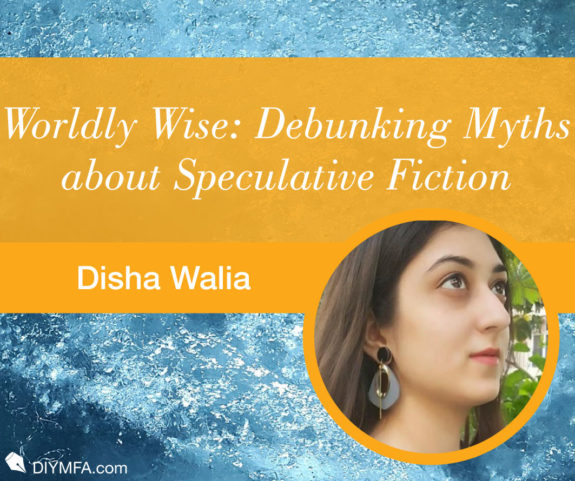Hello, beautiful people on the internet! Stepping out of a world unlike any other, I am Disha and I am here to embark with you on your journey to a brand-new world fresh out of your mind. Do you enjoy setting up your stories in a world filled with imaginary or speculative events? You’ve unlocked the “super genre” known as speculative fiction. And in this column called Worldly Wise, we are going to open the world to speculative fiction, learning something new and useful while having fun. But Worldly Wise isn’t just going to be all about reading. Together, we’re going to take the reins of your story and see it to the finishing line.
If you have been eyeing the literary “super genre” but something someone once said has been holding you back, let’s dive right in and debunk some common myths about speculative fiction. (On a side note, are you looking for psychological proven exercises to improve creativity? I have something for you in the end.)
Myth 1: Speculative Fiction revolves around Sci-Fi.
When we call it a “super genre,” we really mean it. Speculative fiction is sometimes confused for sci-fi or fantasy. Or sometimes a genre hanging between the two. My guess is this has something to do with the fact that Robert Heinlein was the first person to coin the term in 1947 and it has since been largely associated with sci-fi in the 20th century. After all, sci-fi is a popularly read genre and has speculative elements.
But speculative fiction goes beyond that. It includes sci-fi, sci-fi inspired by mythology, folklore, fairy tales, fantasy, supernatural fiction, utopia fiction, dystopia fiction, urban fantasy, superhero fiction, apocalyptic fiction, post-apocalyptic fiction, magical realism, and alternate history fiction.
What I mean to say is, if it has any elements of speculation, or the story is supposed to be set in a world that is unlike ours, you’re aiming for speculative fiction. Do not let the scary myth that speculative fiction is only supposed to be sci-fi hold you back.
Myth 2: To write a good sci-fi (speculative fiction), a science degree is a must.
Stemming from the first of these myths about speculative fiction, this has to take the second spot. Although it is a myth more commonly heard for sci-fi, it is fluid in the sense that people sometimes assume in order to explain the new world and its functioning, a strong scientific backup is a necessity. And who but an individual with a science degree can provide better answers?
However, I think there is more to look at. Sure, a science degree can help through the technicalities, but the first step towards good world building is consistency. So long as there is consistency in your explanation about the workings of your world, the audience will enjoy your work. That also includes stretching the truth enough to make it seem plausible. After all, the audience knows to truly enjoy the genre of speculative fiction they must maintain a willing suspension of disbelief.
Myth 3: Pantsers can just wing it.
I will not lie, writing speculative fiction can be a little challenging, especially if you’re trying your hand at it for the first time. But mostly it is rewarding. The challenge generally lies in keeping the speculative elements consistent. There are so many details to take care of. This is why, if you’re a Pantser, it might not be the best idea to just go with the flow. You might overlook tiny details that might snowball into a plot hole later. In my opinion, keeping tabs on those details is going to make your life easier.
That does not mean you must automatically turn into a Plotter. Not to mention such a switch is extremely hard, if not downright impossible. If you’re wondering whether you’re a Pantser or Plotter, ask yourself one simple question: Do you enjoy outlining your story idea and do just that, or do you enjoy working without a set plan or outline? There is a middle ground too. It’s called Plantser and that just might be the solution you are looking for if this myth about speculative fiction plagues you.
Myth 4: World building is greater than storytelling.
Let’s just say one simple word: No. No amount of world building can replace storytelling. Think of the greatest novel, movie, or TV show you have read or watched that comes under speculative fiction. Chances are, the storytelling was just as powerful as world building, if not more. Now imagine a cool world where a lot of things are happening at once, but there is a lack of storytelling. Doesn’t sound very gripping, does it?
Because no matter how great the world building is, we only care about that world because of the story. Now, I am not saying world building is not important. It is, but only because of the characters we are going on a journey with in that world.
I will take two examples here. One of my most favorite book series: The Harry Potter Series. Yes, the wizarding world is the coolest thing ever and I am still waiting for my Hogwarts letter, but I only care about all of that because every character in that story is compelling. It has always been the characters that have drawn me in and attached me to the world, not the other way around.
For my other example, let’s think about Disney’s Finding Nemo. Talking sea creatures? Cute. A father on a mission to find his kidnapped son (might I add his only child)? Compelling.
Now, if you want to write a story that leaves an impression on your readers and you want them to remember it even years after putting your novel down, you know where to focus. If that isn’t your goal, you can continue believing in this myth about speculative fiction.
An Exercise
If any of these myths about speculative fiction have been holding you back, I hope you are now ready to pull out your notes and memos that kept your exclusive world hidden until now. Remember, writing is for everyone, regardless of the genre. If you take one step forward, it would be a step closer to your wonderful world of speculative elements.
However, if it is a lack of creative boost holding you in its clutches. Let’s try to free you from that as well. I am going to employee my degree in psychology here and give you a little exercise that can help improve creative thinking:
The constrained creativity.
Often, people who find themselves constrained in some way come up with the most creative ideas. I know it might sound counterintuitive, but putting limitations pushes your brain to focus on creating novel ideas and solutions. Let’s try it together.
Tell me or write for yourself a short story about the weather outside your window right now. But your constraint is the story must have an unusual sentient being saying it all in under 100 words. I will be waiting to read your stories!
Next time we meet let’s take the 7 Deadly Sins of Speculative Fiction by the horn and be rid of those monsters for once and for all. Together we’ll see the beauty of Speculative Fiction in all its glory. Until then!

Disha Walia is a lifelong storyteller and an enthusiastic writer and editor in love with the idea of exploring the creative world of words. While making her space in the world of non-fiction and fiction alike, Disha loves to spend even her free time daydreaming about what next to write. Connect with her on www.quillinary.com. You can also follow her on Instagram (@quillinary) and Twitter (@quillinary).







